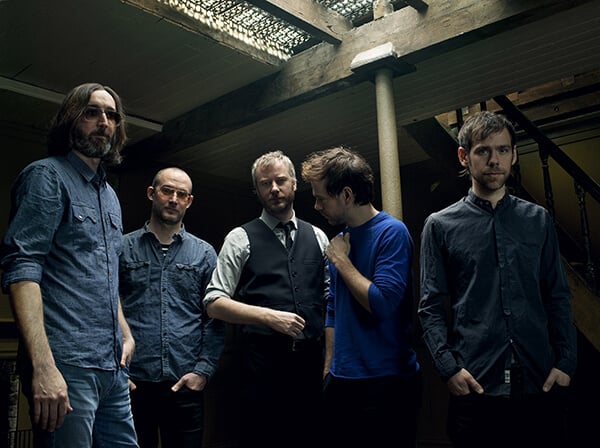Aaron Dessner of The National on Curating Boston Calling With a Spirit of Collaboration
Music festivals, with their undertones of muddy camping, desert heat, or breakfast tacos, can become a series of hashtagged clichés. Yet for Boston Calling, its two years of concerts have reimagined how music festivals can be hosted within an urban center. We spoke with musical curator Aaron Dessner, day job as guitarist with The National, on how Boston Calling has established itself as a vibrant festival through building a community of artists.
Even with the brutalist backdrop of City Hall and brick terrazzo, Boston Calling has an intimacy not found at other festivals. Dessner notes how with two stages there is “no overlap between sets.” The continuous flow of music ensures that “all artists, from the first local act of the day to a major headliner like Beck, play uninterrupted to the entire audience that’s present. That is pretty unusual in the festival landscape.”
This communal vibe echoes how Dessner wound up curating Boston Calling, a position rooted in friendship with festival co-founders Mike Snow and Brian Appel. The two had extensive experience with local media, and had started Crash Line Productions as WFNX/Phoenix Media Group receded. Buoyed by a run of summer block parties in Downtown Crossing, Snow and Appel asked Dessner if he would be interested in selecting artists for a new festival. While Snow and Appel adroitly navigated permits and logistics, Dessner invited performers and convinced his band The National to play opening night.
For all involved, Boston Calling was a gamble. And its subsequent success is grounded in a desire to run a festival that cares for fans and bands. Dessner describes how Boston Calling “allows you to come and go as you please, which makes for a more integrated flow with the city.” This was displayed with amazing efficiency last fall as lighting storms required a massive exodus from City Hall Plaza, and then a reopening of the gates for celebratory sets by Lorde and Childish Gambino as the skies cleared.
Bands playing Boston Calling, Dessner says, feel taken care of because “the festival is artist-curated and very well run from a production standpoint. Mike, Brian and I made sure that the atmosphere would be a positive one for the artists, as that isn’t always the case.” For Dessner this means having “amazing local catering, a well-curated backstage bar and picnic tables for artists to hang out and catch up with each other.” These basic considerations are “quite simple really,” yet “unusual in the festival landscape.”
As music curator, Dessner has brought bands to Boston that range from indie legends (Neutral Milk Hotel), to hip-hop royalty (Nas), and the upcoming festival even welcomes The Pixies for a hometown reception. Even so, Dessner says that Boston Calling has “a focus on giving lesser-known local bands the opportunity to play a major festival.” This, he hopes, results in “a diverse lineup…an interesting cross section of artists we love.” Without specifically mentioning radius clauses that restrict when and where a band can perform before and after a festival, Dessner contends that “booking a festival is always challenging because of availability and how artists tours are routed.” Still, Dessner firmly believes in “the quality of artists Boston Calling has been able to offer fans” and in the importance of “giving new artists a platform to grow.”
Encouraging and supporting other musicians has been central to Dessner’s work with The National, and it shapes the Boston Calling lineup as well. “We have hopefully used every platform available to us to champion other artists, whether through inviting them to festivals or helping make music or spread the word — and we have been fortunate to have many artists do this for us also, REM and Arcade Fire for example.” In extending the same support offered to him, Dessner contends, “There is a very warm, mutually supportive community in the music world that I know.”
The integrity of these relationships, and resulting community, is what Dessner calls, “the main motivation” for even holding a music festival. He explains, “The music we are all making (and listening to) takes on a deeper meaning when you share it with friends and music festivals. The good ones anyway, are hopefully an opportunity to celebrate and build community — and ultimately to collaborate and take risks creatively.”
Boston Calling has been the beneficiary of this vision, as bands that Dessner has connected with are excited to play the festival. In fact, this May showcased a full lineup of Dessner’s musical friends. “Two of my very favorite artists (and collaborators), who also happen to good friends of mine,” Dessner says, “are playing the festival this year: St. Vincent and Sharon Van Etten. They are both brilliant songwriters and performers.”
Another example of this community in action is The Lone Bellow, who performed on Sunday. The band picked Dessner to produce their latest album, even using his garage studio for some recording. Dessner says the sessions pushed the band to “explore the edges and corners of their music. They wanted to achieve something tangible, an unpolished sound you can put your finger on.” Dessner continues, “They are absolutely lovely people and it was one of my favorite studio experiences.”
The audacious idea of holding a bi-annual music festival in Boston was borne from relationships and is sustained by this energy. Speaking of this, Dessner sees a personal responsibility for how Boston Calling operates. “I have always been aware that the sum of what I can do with my brother and other musicians is greater than anything I might do on my own. And the enjoyment of working together is more for me than working alone.” This spirit of collaboration is natural for Dessner, as he says, “My brother and I grew up staring at each other’s hands playing music from a very early age. And our music has always been a product of our community.”
Follow on Twitter @aaron_dessner
Photo by Deirdre O’Callaghan
